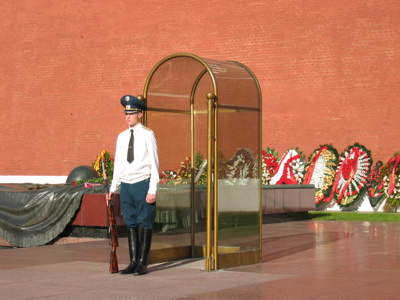Freedom of Speech in Russia

Two Russian twenty-something year olds, one shirtless and the other wearing a cheesy beer t-shirt, yelled out something. Like chimpanzees in an old jungle movie, they jumped up and down. Arms flailing, they strode laughing into the fenced off grounds of Russia's tomb of the unknown soldier and smirked defiantly at a soldier standing honor guard about thirty yards away, next to the Kremlin wall.
Drunk? Maybe.
For this pair, it wasn't just the soldier in the grave who was unknown. World War II, or the Great Patriotic War as the Russians prefer to call it, had no room in two heads filled mostly with alcohol, B-grade TV movies, slot machines and boredom. They probably knew little of the millions of Russians who died, the burned cities and the starvation during enemy blockades.
Only weeks earlier President Putin went out of his way to honor Russian World War II veterans at the Kremlin. After the Soviet Union collapsed, these veterans, old fighters who wore patriotism pinned to their chests, seemed a public embarrassment, an anachronism.
Maybe protecting Communism motivated some of them, but protecting their homes motivated all. These veterans also bore the brunt of Communism's collapse, losing their entire savings to currency changes and receiving pensions that nobody could live on.
The guard snapped to attention, took a large military dress step and hurried toward the two pranksters. The jumping and smirking stopped. The pranksters froze. Showing no emotion, the guard brusquely shoved the pair back toward the crowd on the sidewalk.
They scurried off satisfied that they made the guard move.
That's the end of the story.
Unlike Soviet Moscow, no thick-necked goon slid out of the crowd to check documents and take the pair into custody. No black car rumbled up to haul them away.
A Soviet joke had an American and a Russian debating in which country there was greater freedom of speech. "Why, in the United States," boasts the American, "I can stand in front of the White House and yell 'President Nixon is a fool!' and nothing will happen to me." "That's nothing," retorts the Soviet, "I can go to Red Square and yell loudly 'President Nixon is a fool' three times and nothing will happen to me."
Times have changed. Still, if a vote were taken, certainly among Russian war veterans, a majority probably would have supported punishment, perhaps even the cruel and unusual kind, for showing disrespect at the tomb of the unknown soldier. Free speech, especially when it involves the freedom to be a shameless ass, is often unpopular in practice.
That's why the Russian parliament agonized when creating national symbols. Should burning the Russian flag, even if purportedly an act of free speech, be criminalized? They debated, but with their history of anti-democratic repression too fresh, they recognized a slippery slope and let the matter drop.
Russian legislators don't yet view free speech using, or more accurately stated abusing, national symbols as a threat to their country. I wonder if U.S. legislators, when debating a Constitutional amendment to ban flag burning, wouldn't benefit from talking with their Russian counterparts.